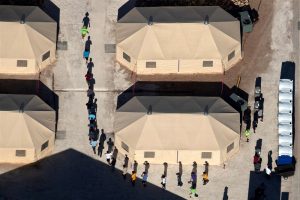The state’s taskforce voted 5-4 on Tuesday to base compensation plans on lineage rather than race
California’s reparations taskforce has recommended compensating the descendants of enslaved and free Black people who were in the US in the 19th century, bringing the state one step closer to becoming the first in the US to pay African Americans for the harms of slavery.
The taskforce, established under state law to study reparations, voted on Tuesday in favor of a compensation and restitution plan that is based on lineage. The group for months has been tackling thorny questions about who should be eligible, and had considered recommending reparations based on race, which would mean a broader group of recipients.
Supporters of the narrower eligibility have said that reparations should be available to direct descendants of slaves along with descendants of Black residents who were free and migrated to the country in the 19th century, given the challenges in documenting genealogy and the risk at the time of becoming enslaved. They have argued that Black immigrants who migrated to the US in the 20th and 21st centuries did not experience the same harms as people who were kidnapped and enslaved; they also said that eligibility based on lineage would be more likely to survive a legal challenge.
The decision, which passed by a vote of 5-4 on Tuesday night, has sparked widespread debate about who should be compensated for the continuing impacts of slavery, and how the state should factor in systemic racism that remains pervasive in society. The taskforce, which has been collecting testimony about the many forms of discrimination tied to the legacy of slavery, is due to issue its first formal report on its findings by 1 June.
Some on the taskforce had pushed for reparations for all Black residents, regardless of lineage, arguing that they continue to suffer from inequality in housing, education, employment, criminal justice and other arenas. They have also raised concerns about the difficulties of proving lineage, noting that enslavers often shipped people to work in various plantations across the US and outside of the country.
Kavon Ward, co-founder of Where is My Land, a group fighting to reclaim stolen land for Black Americans, said on Wednesday that she was in favor of a broader eligibility: “Black people continue to deal with racism and discrimination in every aspect of this country, whether healthcare, juvenile justice or the wealth gap.” Black residents who are not descendants of slaves have still been harmed by the legacy of slavery, whether from Jim Crow laws or the prison system, and also deserve restitution, she said.
Ward, a resident of Manhattan Beach in southern California, founded a group in 2020 called Justice for Bruce’s Beach to advocate that beachfront land that the city seized from a Black couple in the 1920s be returned to the family. She said she hoped the taskforce would push for similar reparations: “Land reclamation is a way to repair the damage … and Black people should get stolen land back, and should get restitution.”
Chief Duane Yellow Feather Shepard, whose family are descendants of Charles and Willa Bruce, the couple whose land was seized in Manhattan Beach, said on Wednesday that he supported limiting reparations to descendants of slaves as the most appropriate way forward: “It would certainly economically help a lot of people who are suffering right now and have been suffering since the end of slavery.” He noted that there were many Black unhoused people in California who were descendants of slaves and could benefit greatly from compensation.Advertisementhttps://704b342f4405ead831321e4409e40235.safeframe.googlesyndication.com/safeframe/1-0-38/html/container.html
The taskforce has not yet decided how residents would prove eligibility and what kind of reparations they could receive; the state would need to pass a new law to dole out compensation.
Two million Black Californians are estimated to be descendants of slaves, out of 2.6 million total Black residents in the state, the taskforce said in a meeting on Wednesday, citing estimates that a reparations bill to support those descendants could cost $672bn. The taskforce also discussed possible frameworks that would consider specific harms and atrocities to prioritize, such as unjust property takings by eminent domain, segregated education, police violence and housing discrimination.
The taskforce has collected testimony on the continuing inequalities in the state, noting that while Black residents make up 5% of California, they are significantly overrepresented in jails, prisons and unhoused populations, and that Black homeowners continue to face significant discrimination in home appraisals.
Shirley Weber, the California secretary of state who authored the legislation creating the taskforce, argued for prioritizing descendants for generations of forced labor, broken family ties and police terrorism. The daughter of sharecroppers forced to flee Arkansas in the dead of night, she recalled how the legacy of slavery had broken her family and stunted their ability to dream of anything beyond survival.
“We must be aggressive in our efforts to be honest and direct and to figure out what we need to do in California and be an example to the rest of the nation in how we begin to reckon with ourselves,” she said last year.




